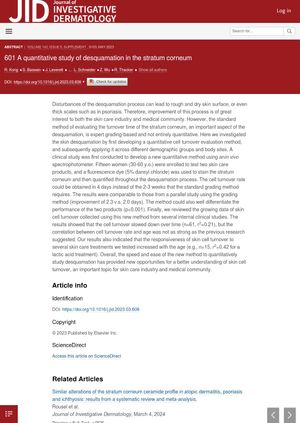A Quantitative Study of Desquamation in the Stratum Corneum
April 2023
in “
Journal of Investigative Dermatology
”

TLDR New method measures skin cell turnover quickly and effectively, showing turnover slows with age and responds more to treatments in older skin.
The document presents a new quantitative method for evaluating skin cell turnover, an important aspect of the desquamation process. The method, tested on 15 women aged 30-60, uses a fluorescence dye to stain the stratum corneum, allowing for cell turnover rate to be obtained in 4 days, significantly faster than the 2-3 weeks required by the standard grading method. The results were comparable to those from a parallel study using the grading method, and the new method could differentiate the performance of two skin care products. Further studies using this method showed that cell turnover slows down over time (n=61, r2=0.21), but the correlation between cell turnover rate and age was not as strong as previously suggested. The study also found that the responsiveness of skin cell turnover to several skin care treatments increased with age (e.g., n=15, r2=0.42 for a lactic acid treatment). This new method provides a faster, more efficient way to study desquamation, offering new opportunities for the skin care industry and medical community.
